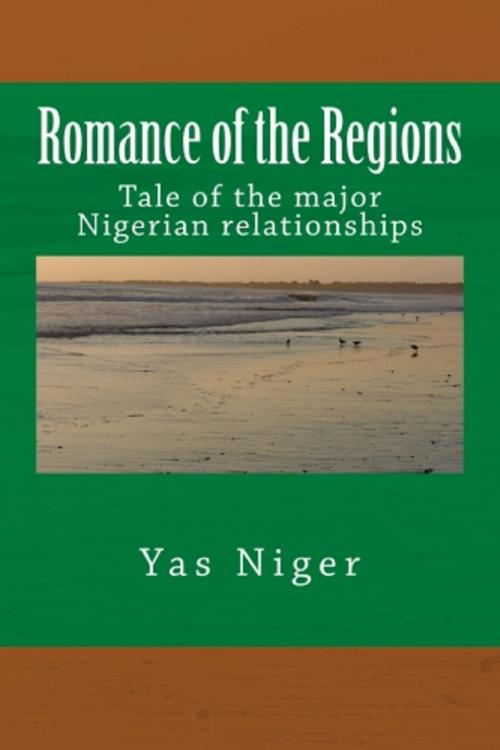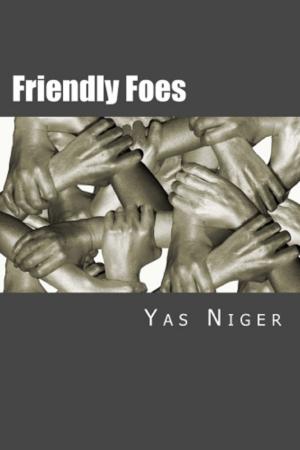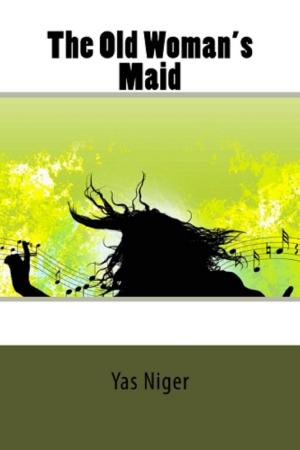| Author: | Yas Niger | ISBN: | 9781301809639 |
| Publisher: | Yas Niger | Publication: | August 9, 2013 |
| Imprint: | Smashwords Edition | Language: | English |
| Author: | Yas Niger |
| ISBN: | 9781301809639 |
| Publisher: | Yas Niger |
| Publication: | August 9, 2013 |
| Imprint: | Smashwords Edition |
| Language: | English |
Adudu Wa is the pretty, unmarried Yoruba girl, from an educated family. They are of a dominant almost coastal tribe, west of the Niger delta. A highly spirited ancient clan, loud in their presence, proud in their full culture and rich in their creativity as in their wealth, at home as abroad. She is too proud to be belittled. She stoops to take in the fine scenery of personal achievement, not caring about the calm but hapless folly she pointlessly embarks upon for outwards luxury.
She would worship any popularly revered deity in more ways than any particular divinity would conventionally approve of, and still contradict the tenets of the same faith without desecrating it. She would cross herself inside a mosque and only pray towards the east inside churches. She wouldn’t leave behind the tiniest string of her hair at her regular hairdresser’s, but repeatedly gives the strangest fetish weirdo tresses of her hair for rituals to fend off bad luck and eternally trap favour for herself, whether it is represented by a guy or some inanimate object.
Ewu Kwenu is a middle-aged single Igbo man, with wealthy prospects. He is an industrious half literate, culturally bond to his self-belief and emotionally attached to his fast eroding dominance. He gloats in the densely forested eastern lands he thinks he rules. He speaks English commonly but uses his native dialect as a sort of military code. He embodies the spirit of his proud dissident linage, made of strong willed people, incredibly hard to harness but easy to win over. In their customized nature they are mystical, traditional and religious, with a contagious bullish self-worth that made them appear very knowledgeable of western lifestyle.
Their passable use of the pidgin variety of English creates this impression. Their preference for being the only real users of their native dialect made them appear cultish in nature, with the sort of coded communication that secludes intentions in their major language, which is least spoken elsewhere. It is almost only spoken outside its origins by their kit and kin. This is their biggest weakness. It only made them industrious guests, meaningfully contributing to host communities, but less hospitable hosts to the contribution of others in their own few domains.
Arabiyu Ab’Arewamaliki is a lot younger. A multiply married Hausa lad with highly opinionated education that is as vast as it is rigid. He is of an obscure clan of commercially gifted tribesmen, settled in the arid sub-Sahara up north, above the married rivers Niger and Benue. He has enough formal education to call the bluff of western literacy’s perception of his faith’s suppressive rigidity, and act on it. He reveals he isn’t in the habit of being pretentious about the sacredness of his linage. His people are a rich stew of generations of dedicated heathens, tired of running away from slavers, drought and from their ceaseless petty tribal wars.
As the only still oddly fully committed spiritual idealist, they’re overwhelmed by doubt. The life he desires and preaches cannot run concurrently without one or two major flaws. His life as a Nigerian opts for the appropriate, as the immediate situation allows. He gets away with it because he truly needs the nationhood more than his fanatical independence.
Burdened by an enslaved free spirited reality, he helplessly watches the world educate him. He gets too knowledgeable in proven world literacy to deny his follies as he desires much more on earth than promised him in paradise, just like everybody else around him, he never admits.
The narrator schooled with Adudu Wa, worked for years as a supervisor in Ewu Kwenu’s metal workshop and befriended Arabiyu Ab’Arewamaliki. Arabiyu met Adudu last and also wanted her for his third wife, before she became Ewu’s first.
Adudu Wa is the pretty, unmarried Yoruba girl, from an educated family. They are of a dominant almost coastal tribe, west of the Niger delta. A highly spirited ancient clan, loud in their presence, proud in their full culture and rich in their creativity as in their wealth, at home as abroad. She is too proud to be belittled. She stoops to take in the fine scenery of personal achievement, not caring about the calm but hapless folly she pointlessly embarks upon for outwards luxury.
She would worship any popularly revered deity in more ways than any particular divinity would conventionally approve of, and still contradict the tenets of the same faith without desecrating it. She would cross herself inside a mosque and only pray towards the east inside churches. She wouldn’t leave behind the tiniest string of her hair at her regular hairdresser’s, but repeatedly gives the strangest fetish weirdo tresses of her hair for rituals to fend off bad luck and eternally trap favour for herself, whether it is represented by a guy or some inanimate object.
Ewu Kwenu is a middle-aged single Igbo man, with wealthy prospects. He is an industrious half literate, culturally bond to his self-belief and emotionally attached to his fast eroding dominance. He gloats in the densely forested eastern lands he thinks he rules. He speaks English commonly but uses his native dialect as a sort of military code. He embodies the spirit of his proud dissident linage, made of strong willed people, incredibly hard to harness but easy to win over. In their customized nature they are mystical, traditional and religious, with a contagious bullish self-worth that made them appear very knowledgeable of western lifestyle.
Their passable use of the pidgin variety of English creates this impression. Their preference for being the only real users of their native dialect made them appear cultish in nature, with the sort of coded communication that secludes intentions in their major language, which is least spoken elsewhere. It is almost only spoken outside its origins by their kit and kin. This is their biggest weakness. It only made them industrious guests, meaningfully contributing to host communities, but less hospitable hosts to the contribution of others in their own few domains.
Arabiyu Ab’Arewamaliki is a lot younger. A multiply married Hausa lad with highly opinionated education that is as vast as it is rigid. He is of an obscure clan of commercially gifted tribesmen, settled in the arid sub-Sahara up north, above the married rivers Niger and Benue. He has enough formal education to call the bluff of western literacy’s perception of his faith’s suppressive rigidity, and act on it. He reveals he isn’t in the habit of being pretentious about the sacredness of his linage. His people are a rich stew of generations of dedicated heathens, tired of running away from slavers, drought and from their ceaseless petty tribal wars.
As the only still oddly fully committed spiritual idealist, they’re overwhelmed by doubt. The life he desires and preaches cannot run concurrently without one or two major flaws. His life as a Nigerian opts for the appropriate, as the immediate situation allows. He gets away with it because he truly needs the nationhood more than his fanatical independence.
Burdened by an enslaved free spirited reality, he helplessly watches the world educate him. He gets too knowledgeable in proven world literacy to deny his follies as he desires much more on earth than promised him in paradise, just like everybody else around him, he never admits.
The narrator schooled with Adudu Wa, worked for years as a supervisor in Ewu Kwenu’s metal workshop and befriended Arabiyu Ab’Arewamaliki. Arabiyu met Adudu last and also wanted her for his third wife, before she became Ewu’s first.















